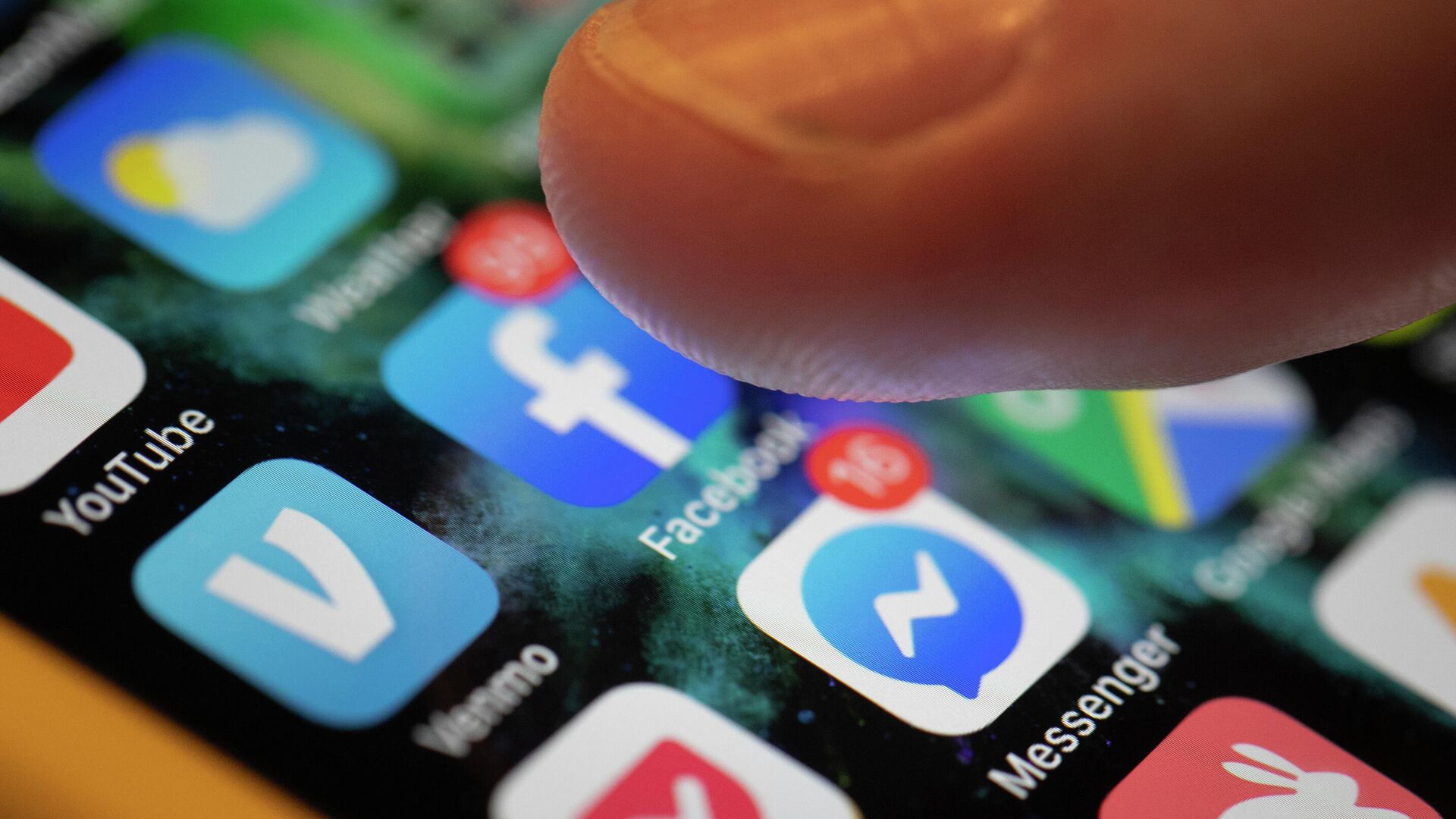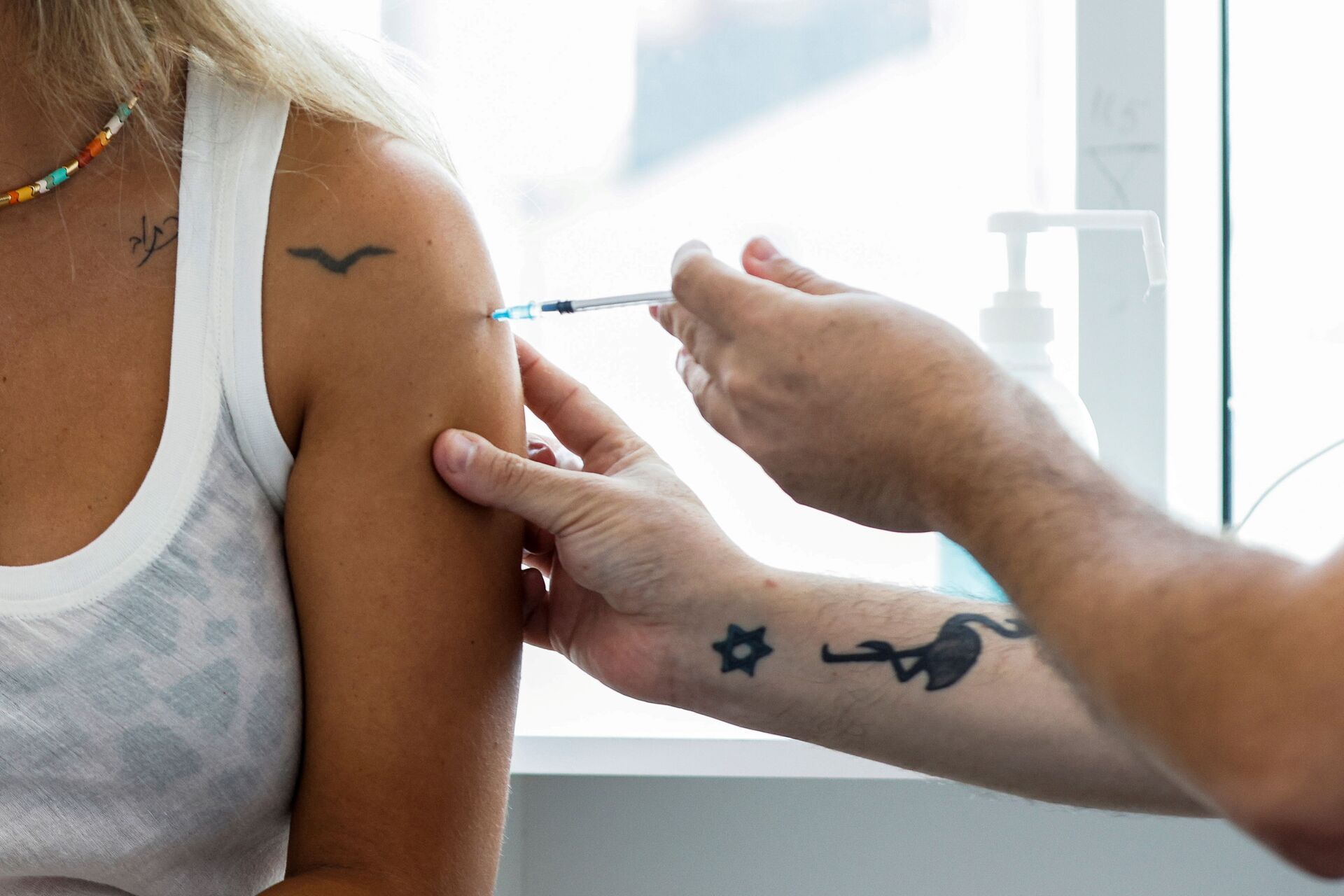https://sputnikglobe.com/20211205/social-media-has-become-tool-for-anti-vaxxers-as-israel-struggles-to-cope-with-trend-1091254366.html
Social Media Has Become Tool for Anti-Vaxxers as Israel Struggles to Cope With Trend
Social Media Has Become Tool for Anti-Vaxxers as Israel Struggles to Cope With Trend
Sputnik International
A local expert says it is impossible for the state to cope with all the disinformation such websites have to offer. And this is why he is calling on the... 05.12.2021, Sputnik International
2021-12-05T07:10+0000
2021-12-05T07:10+0000
2023-01-15T17:24+0000
middle east
vaccination
anti-vaccination
coronavirus
israel
https://cdn1.img.sputnikglobe.com/img/07e5/0b/0a/1090609976_0:247:2867:1860_1920x0_80_0_0_e1b20c612ab3a6d63186099a7b90406a.jpg
In Israel, the press is following with concern the climbing number of cases associated with the new variant of COVID-19, Omicron.So far, seven Israelis have been diagnosed with the new strain and the medical establishment suspects there are 27 other potential patients.Need to Be CautiousNot much is known about this strain but experts believe the variant is 30 to 50 times more contagious than the original virus. Others claim the actual number is up to 500 percent. And that is causing the Israeli media to sound the alarm.Over the past week and a half, when the first cases emerged in Israel, local press circulated an array of reports about the new strain, and TV studios hosted guests with a variety of opinions, something that only added to the general feeling of fear.But Professor Cyrille Cohen, a member of the advisory committee for clinical trials of the coronavirus vaccine at the Israeli Ministry of Health, says it is too early to jump to conclusions when talking about Omicron.For now, and until further details about the strain are revealed, Cohen suggests "being cautious". The Israeli government seems to be following Cohen's lead.Shortly after the discovery of the new strain, Israel shut its doors to visitors from 50 African countries where Omicron has been registered. It also barred foreign tourists from entering the country, several destinations were branded as red, meaning Israelis were banned from travelling there, and the government limited the number of people who can be together in a closed space.Hysteria and Distrust of the SystemThe trouble is that on social media platforms hysteria has already erupted. Some stir panic by explaining how contagious the strain is, others flag conspiracy theories and claim the new variant, just as COVID-19 itself, is a "fiction" designed to brainwash and control the masses.Cohen believes that this discourse stems from people's distrust in the medical system and the political establishment.Since the outbreak of the coronavirus pandemic in early 2020, Israeli authorities have been painting a picture of gloom and doom. They imposed restrictions and came up with new regulations. But the catch was that some of them were inconsistent. Others were not adhered to even by politicians themselves.Such was the case with former Prime Minister Benjamin Netanyahu who hosted his son and the latter's girlfriend for a festive dinner in 2020 amid the raging pandemic.A similar "crime" was also committed by ex-Israeli President Reuven Rivlin, and more recently it was the spouse of the current PM, who decided to fly abroad together with her children despite Omicron and despite the recommendation by Bennett himself not to leave Israel.Building TrustIsrael has been putting maximum effort into creating that dialogue. TV commercials and billboards explaining the dangers of COVID-19 and the need to get vaccinated are commonplace. Talk shows now feature "Ask a Doctor" segments that allow listeners and viewers to voice their concerns directly to specialists, and great emphasis is paid to the education of children.In a way, those efforts have borne fruit. More than 5.7 million of Israel's 9 million residents have received two shots of the Pfizer vaccine. Slightly over 4 million have received the booster shot. But there is also a growing trend of those who reject the inoculation and who encourage others to do so.Facebook and Twitter have become the go-to platforms where such beliefs are widely circulated. They have also become places where representatives of the medical establishment are threatened and where mass anti-vaccination rallies are organised.To be able to win that battle, the expert suggests that Israel's medical establishment needs to cooperate with leading social media influencers, who can help to educate the masses. But he also says that the state needs to limit and filter the information such platforms are circulating because it is "an efficient way to save lives, even though it might harm democracy".
israel
Sputnik International
feedback@sputniknews.com
+74956456601
MIA „Rosiya Segodnya“
2021
News
en_EN
Sputnik International
feedback@sputniknews.com
+74956456601
MIA „Rosiya Segodnya“
Sputnik International
feedback@sputniknews.com
+74956456601
MIA „Rosiya Segodnya“
middle east, vaccination, anti-vaccination, coronavirus, israel
middle east, vaccination, anti-vaccination, coronavirus, israel
Social Media Has Become Tool for Anti-Vaxxers as Israel Struggles to Cope With Trend
07:10 GMT 05.12.2021 (Updated: 17:24 GMT 15.01.2023) A local expert says it is impossible for the state to cope with all the disinformation such websites have to offer. And this is why he is calling on the government to limit the content on these platforms and urging them to work closely with social media influencers.
In Israel, the press is following with concern the climbing number of cases associated with the new variant of COVID-19, Omicron.
So far,
seven Israelis have been diagnosed with the new strain and the medical establishment suspects there are 27 other potential patients.
Not much is known about this strain but experts believe the variant is 30 to 50 times more contagious than the original virus. Others claim the actual number is up to 500 percent. And that is causing the Israeli media to
sound the alarm.Over the past week and a half, when the first cases emerged in Israel, local press circulated an array of reports about the new strain, and TV studios hosted guests with a variety of opinions, something that only
added to the general feeling of fear.But Professor Cyrille Cohen, a member of the advisory committee for clinical trials of the coronavirus vaccine at the Israeli Ministry of Health, says it is too early to jump to conclusions when talking about Omicron.
"In order to determine whether the variant is problematic or not, we look at three factors. Whether it is more contagious, and we believe it is. Whether it causes more severe disease and whether it is resilient to the vaccine. We need two weeks to find that out".
For now, and until further details about the strain are revealed, Cohen suggests "being cautious". The Israeli government seems to be following Cohen's lead.
Shortly after the discovery of the new strain, Israel shut its doors to visitors from 50 African countries where Omicron has been registered. It also barred foreign tourists from entering the country, several destinations were branded as red, meaning Israelis were banned from travelling there, and the government limited the number of people who can be together in a closed space.
"We have seen lots of mutations inside the variant so we need to be cautious about the situation. But that doesn't mean we should be hysterical", said Cohen.
Hysteria and Distrust of the System
The trouble is that on social media platforms hysteria has already erupted. Some stir panic by explaining how contagious the strain is, others flag conspiracy theories and claim the new variant, just as COVID-19 itself, is a "fiction" designed to brainwash and control the masses.
Cohen believes that this discourse stems from people's distrust in the medical system and the political establishment.
Since the outbreak of the coronavirus pandemic in early 2020, Israeli authorities have been painting a picture of gloom and doom. They imposed restrictions and came up with new regulations. But the catch was that some of them were inconsistent. Others were not adhered to even by politicians themselves.
Such was the case with former Prime Minister Benjamin Netanyahu who hosted his son and the latter's girlfriend for a festive dinner in 2020 amid the raging pandemic.
A similar "crime" was also committed by ex-Israeli President Reuven Rivlin, and more recently it was the spouse of the current PM, who decided to fly abroad together with her children despite Omicron and
despite the recommendation by Bennett himself not to leave Israel.
"If authorities are telling you one thing and the reality shows you something completely different, you lose faith in the system", says Cohen. "But to get over the pandemic, we need the cooperation of the masses. We need to say openly that there are things we simply don't know, and we need to find a measured way to deliver information and build a dialogue".
Israel has been putting maximum effort into creating that dialogue. TV commercials and billboards explaining the dangers of COVID-19 and the need to get vaccinated are commonplace. Talk shows now feature "Ask a Doctor" segments that allow listeners and viewers to voice their concerns directly to specialists, and great emphasis is paid to the education of children.
In a way, those efforts have borne fruit. More than 5.7 million of Israel's 9 million residents have received two shots of the Pfizer vaccine. Slightly over 4 million have received the booster shot. But there is also a growing trend of those who reject the inoculation and
who encourage others to do so.
Facebook and Twitter have become the go-to platforms where such beliefs are widely circulated. They have also become places where representatives of the
medical establishment are threatened and where
mass anti-vaccination rallies are organised.
"We can't cope with everything there is on social media. It often spreads conspiracy theories and misinformation. It influences the minds of people, and even the sane ones can go crazy just reading up everything these platforms have to offer", says Cohen.
To be able to win that battle, the expert suggests that Israel's medical establishment needs to cooperate with leading social media influencers, who can help to educate the masses. But he also says that the state needs to limit and filter the information such platforms are circulating because it is "an efficient way to save lives, even though it might harm democracy".





